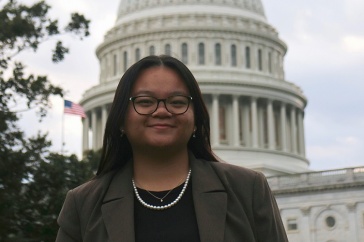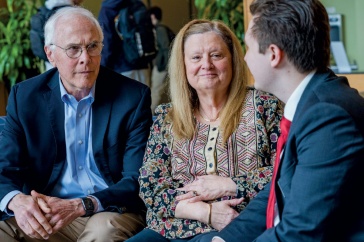
Kate Frazier '12 with Morocco in the ring
When a glossy brown Hanoverian known as Morocco whinnied and reared up, Kate Frazier ’12 pulled down on the horse’s halter and gave her three firm pats at the base of her muscular neck, saying, “You’re okay. You’re okay.”
Frazier’s preternatural composure calmed the mare and soon the two were in sync again, demonstrating the tenuous relationship between horse and rider as one that relies on far more than verbal communication alone.
Frazier knows horses … she knows their anatomy and their personalities. She describes her own appendix quarter horse, PA, as honest. By that Frazier means, “He never takes advantage. I’d put a five-year-old on him and know he’d be on his best behavior.”
It wasn’t always like that.
Frazier and PA taught each other in the early years. Frazier acquired PA when he was 10 years old and full of coltish enthusiasm. “He’d always get so excited, bucking across the field, but he never did anything intentionally bad,” says Frazier, who successfully conditioned PA to compete with her throughout the Northeast. As an intermediate hunter/jumper, Frazier has become an equestrian athlete capable of pairing with any mount – as often she must during competitions – and using her intuitive communication skills to become a synchronistic team with an unfamiliar horse.
The beauty and proximity of the equine facility at UNH underscored Frazier’s determination to attend COLSA as a pre-vet student. “The reason I came was that UNH is really well known for its pre-vet program and has a good track record for student acceptance into vet school.” This fall, Frazier will attend Cornell University College of Veterinary Medicine with plans to, ultimately, become an equine sports medicine specialist.
When she looks back on her time at COLSA, Frazier – a 3.99 GPA student – recognizes that the use of the facilities was one of the most valuable aspects of her education. She participated in CREAM during her junior year, and considers such collaborative management experience, caring for a dairy herd with fellow classmates, to be a pivotal point in her development giving her the confidence to work with others in achieving vast goals. “There were thirty of us on the team. We made decisions on management and who would cover the four shifts a day,” says Frazier who preferred feeding to the other duties.
Frazier also took horsemanship classes throughout her four years, and competed with the Intercollegiate Horse Show Association team, rising up through the levels of regional and zone championships under the direction of Chris Keim. “Everyone on the team is so welcoming and supportive,” she says. “That was what kept me in school when I experienced homesickness as a freshman. That was what really made the difference.”
From those initial life adjustments to fulfilling her dreams, Frazier has always been in clear pursuit of her goals, taking all the right steps along the way to shape her own success. She spent a summer working for the Chippens Hill Veterinary Hospital in Bristol, Connecticut – her hometown – writing up six case studies a week that she submitted to her advisor, Dr. Richard French. His suggestion to carry out her field experience class in that way made for, as Frazier says, “a really good experience because I didn’t realize how much I was learning until a year later when things would come up and I’d realize how much I remembered from what I learned then.”
On Frazier’s mind now is the instability facing the university’s facilities, due to unprecedented state cuts. While the master plan evolves to reflect the needs and interests of many constituencies, Frazier voices her concern for the welfare of the agricultural land and the facilities that made her education here so unique. “The University should be proud of these facilities,” she says. “They are part of what gives it the strongest of pre-vet programs. The Veterinary Diagnostic Lab, the dairy barn, the equine center … those are the things that made my education here so good. I knew that having experience at the University’s facilities would help me get into vet school.”
Frazier’s uncanny ability to sync with a horse and have it follow her lead, and the successes she found and made at COLSA, will probably have an impact that reverberates far beyond vet school and into her forthcoming career in equine sports medicine.
Originally published by:
COLSA INSIGHT, Newsletter for the College of Life Sciences & Agriculture




















































